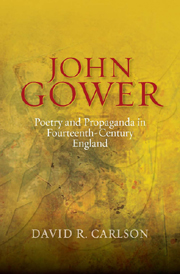Book contents
- Frontmatter
- Contents
- Abbreviations and Citation Forms
- Introduction: Gower in History
- I Fourteenth-Century Panegyric Verse and Official Writing
- II Gower's State-Official Late Poetry
- 6 Official Writing at the Lancastrian Advent
- 7 English Poetry in Late Summer 1399
- 8 The Cronica tripertita and its Official Source
- 9 Gower after the Revolution: Client and Critic
- Bibliography
- Index
- VOLUMES ALREADY PUBLISHED
8 - The Cronica tripertita and its Official Source
from II - Gower's State-Official Late Poetry
Published online by Cambridge University Press: 05 February 2013
- Frontmatter
- Contents
- Abbreviations and Citation Forms
- Introduction: Gower in History
- I Fourteenth-Century Panegyric Verse and Official Writing
- II Gower's State-Official Late Poetry
- 6 Official Writing at the Lancastrian Advent
- 7 English Poetry in Late Summer 1399
- 8 The Cronica tripertita and its Official Source
- 9 Gower after the Revolution: Client and Critic
- Bibliography
- Index
- VOLUMES ALREADY PUBLISHED
Summary
Lancastrian officers and clerical subordinates had drafted components of the “Record and Process” of Richard's deposition and Henry's installation, suiting facts to fit immediate agenda of the new state-ruler. Others had assembled the components in the form of the final complete document, for its emplacement in the official record. Still others had seen to the official fabrication's further rebroadcast, by one means and another, putting various redactions about the kingdom. And other poets too were busying themselves, propaganda-wise, about spreading news of the conditions of the advent: the several poets of 1399 and Chaucer too (with the lines “O conqueror of Brutes Albyon”), amongst other writers, whether these several others were compulsi or were volunteers, writing ad complacenciam aut consolacionem, though not ad peticionem aut mocionem. The Lancastrian state's tendential need at the moment of its installation may seem clear enough to implicate the Cronica tripertita, such additional evidence as there may be aside, like Gower's other writings and the several records of his relations with the one who made himself Henry IV, both before and after his advent to regality.
Nonetheless, be such circumstantial and analogous evidence as it may, the Cronica tripertita remains susceptible of characterisation as a state-official performance, in a particular narrow sense, no matter whether Gower himself should say anything instructive within his own poem, by way of internal witness, or whether anyone else elsewhere provides the like, by way of external witness, in the form of some third-party account or express commissioning-receipts to the effect that the poet wrote what he did under compulsion.
- Type
- Chapter
- Information
- John Gower, Poetry and Propaganda in Fourteenth-Century England , pp. 153 - 196Publisher: Boydell & BrewerPrint publication year: 2012



